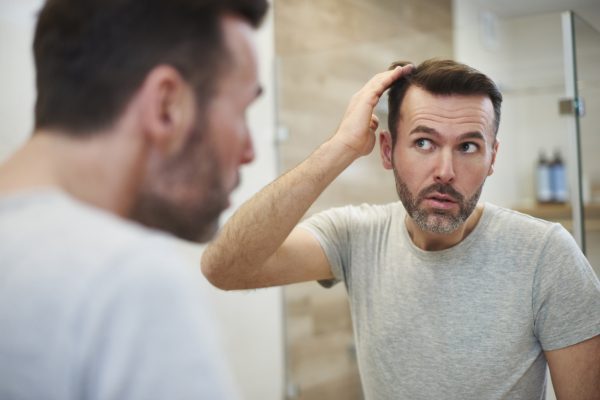
Testosterone, the primary male sex hormone, is a crucial factor in the development of secondary sexual characteristics, such as muscle growth and deeper voice. However, it is also linked to hair loss, especially in individuals genetically predisposed to androgenic alopecia (male or female pattern baldness). The relationship between testosterone and hair loss is primarily driven by its conversion into dihydrotestosterone (DHT), a potent hormone that can affect hair follicles. Does Testosterone Cause Hair Loss? This article will tell you everything you should know about Testosterone hair loss.
Does Testosterone Cause Hair Loss?
Testosterone is converted into DHT by the enzyme 5-alpha reductase. DHT binds to androgen receptors in hair follicles, particularly on the scalp, causing the follicles to shrink over time. This shrinkage leads to thinner hair and, eventually, the cessation of hair growth. In men, this manifests as male pattern baldness, a common form of hair loss that typically begins at the temples or crown. Women, too, can experience hair thinning or loss due to increased testosterone levels, as seen in conditions like polycystic ovary syndrome (PCOS).
Testosterone Therapy and Hair Loss
For individuals undergoing testosterone replacement therapy (TRT) or other forms of testosterone supplementation, hair loss can be a potential side effect. TRT is often prescribed for men with low testosterone levels to treat symptoms such as fatigue, reduced libido, and muscle loss. However, the increased testosterone levels can lead to higher DHT levels, which, in turn, can accelerate hair thinning or cause new bald patches.
Women who undergo testosterone therapy, such as those transitioning or using testosterone for hormone replacement, may also face a heightened risk of hair loss. The effects are often similar to those seen in men, though the pattern may differ due to the influence of other hormones and genetic factors.
Factors Influencing Testosterone-Related Hair Loss
Factors that influence testosterone-related hair loss may include:
- Genetics: If you have a family history of baldness, you are more likely to experience testosterone-induced hair loss.
- Age: As people age, testosterone levels naturally decline, but the body’s production of DHT may continue, leading to gradual hair thinning.
- Medical conditions: Conditions like polycystic ovary syndrome (PCOS) in women can lead to elevated testosterone and DHT levels, contributing to hair thinning.
Managing Testosterone-Induced Hair Loss
- Medications: Drugs like finasteride and dutasteride inhibit the conversion of testosterone to DHT, potentially slowing or preventing hair loss.
- Hair transplants: For those with significant hair loss, transplants can help restore hair to thinning areas.
- Lifestyle changes: Reducing stress and maintaining a healthy diet can help maintain hormonal balance, potentially minimizing hair thinning caused by testosterone.
Frequently Asked Questions About Does Testosterone Cause Hair Loss
1. Does testosterone directly cause hair loss?
Testosterone itself doesn’t directly cause hair loss, but it gets converted into dihydrotestosterone (DHT), a more potent androgen. DHT binds to hair follicles, shrinking them and leading to thinner hair, which over time can result in hair loss. This process is especially prevalent in individuals with a genetic predisposition to androgenic alopecia, also known as male or female pattern baldness.
2. Can testosterone replacement therapy (TRT) cause hair loss?
Yes, testosterone replacement therapy (TRT) can lead to hair loss. TRT increases testosterone levels, which can elevate DHT levels, potentially triggering hair thinning or loss in those already genetically predisposed. This is more common in men, but women undergoing testosterone therapy may experience similar effects.
3. Can women experience hair loss from testosterone?
Yes, women can experience hair thinning or loss due to increased testosterone levels. Conditions like polycystic ovary syndrome (PCOS) often result in elevated testosterone, which can lead to thinning hair, especially around the hairline and crown. Women undergoing testosterone therapy for various reasons (e.g., hormone replacement or transition) may also see similar effects.
4. Is hair loss from testosterone therapy reversible?
Testosterone therapy hair loss may be reversible, depending on the extent of the damage and how soon treatment is started. Medications like finasteride or minoxidil, which reduce DHT levels, can help slow or reverse hair loss in some cases. However, if the hair follicles are severely damaged, regrowth may be more difficult.
5. How to prevent hair loss caused by testosterone?
Several treatments can help prevent or slow down hair loss due to testosterone, such as:
- 5-alpha reductase inhibitors (e.g., finasteride and dutasteride) that block the conversion of testosterone to DHT.
- Minoxidil (topical solution) can help stimulate hair regrowth.
- Hair restoration treatments like hair transplants may be considered if hair loss becomes significant.
6. Is hair loss from testosterone common?
Hair loss from testosterone is common, especially for men who have a genetic predisposition to androgenic alopecia. Women with conditions like PCOS or those undergoing testosterone therapy may also be at risk for hair loss. However, not everyone will experience hair loss, and the severity can vary widely.
7. Can lifestyle changes help with hair loss from testosterone?
While lifestyle changes such as reducing stress, improving nutrition, and avoiding harsh hair treatments may support overall hair health, they are unlikely to directly counteract the effects of elevated DHT levels caused by testosterone. Medical treatments or interventions are usually necessary for managing testosterone-related hair loss.
Conclusion
Testosterone does have a significant impact on hair loss, primarily through its conversion to DHT, which can shrink hair follicles and lead to thinning or baldness. While testosterone therapy can contribute to hair loss, the genetic predisposition to androgenic alopecia plays a crucial role in determining the severity of the effect. If you are concerned about hair loss due to testosterone, it’s important to speak with a healthcare professional who can help manage and address the issue effectively.

Leave a Reply